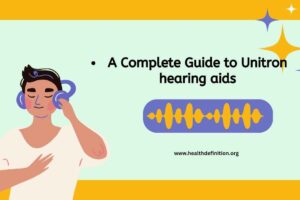
Sudden hearing loss is a serious condition that can occur unexpectedly, affecting one or both ears. This condition requires prompt medical attention to maximize recovery chances. If you experience sudden hearing loss, it’s essential to seek immediate medical care. Early treatment, such as corticosteroids like prednisone, can reduce inflammation and improve the likelihood of regaining hearing. The effectiveness of treatment depends on factors like how quickly treatment is started and the severity of the hearing loss. If you notice a sudden decline in your hearing, don’t hesitate to consult with a healthcare professional to determine the cause and explore available treatment options for the best possible outcome.
Understanding Sudden Hearing Loss
Sudden sensorineural hearing loss (SSHL), commonly known as sudden hearing loss, occurs when you experience an unexplained and rapid loss of hearing — usually in one ear — within a 72-hour period. It’s often accompanied by tinnitus (ringing in the ears) or a feeling of ear fullness. While the exact causes vary, common culprits include viral infections, autoimmune conditions, poor blood circulation to the inner ear, or inflammation.
When faced with sudden hearing loss, prompt treatment is crucial to improve the chances of recovery. This is where prednisone comes into play.
How Prednisone Works for Sudden Hearing Loss
How Quickly Does Prednisone Start Working?
The effectiveness of prednisone for sudden hearing loss can vary widely among individuals. Factors like the severity of the hearing loss, the promptness of treatment, and how the body responds to the medication all play a role in how quickly prednisone works. In some cases, improvement may be noticeable within a few days, while others might take longer to see results. The sooner treatment is started after the onset of hearing loss, the better the chances of recovery, but individual responses to the medication can still differ, leading to varying outcomes.
1. Initial Response (24-48 hours)
Early response: Some patients may notice improvements within 24 to 48 hours after starting prednisone for sudden hearing loss.
Subtle changes: Initial signs of progress often include a slight reduction in ear fullness or pressure.
Hearing clarity: Mild improvements in sound sharpness or volume may occur early in the treatment process.
Varied results: Not everyone experiences immediate improvements — responses to prednisone can differ based on the severity and cause of the hearing loss.
Continued recovery: Even if early improvements are minimal, hearing often continues to gradually improve over days or weeks with ongoing treatment.
2. Significant Improvement (1-2 weeks)
3. Long-Term Recovery (3-4 weeks or more)
Factors Influencing How Quickly Prednisone Works
Several factors can affect how quickly prednisone works for sudden hearing loss:
Timing of treatment: Starting prednisone as soon as possible after sudden hearing loss improves the chances of recovery significantly.
Dosage regimen: Doctors often prescribe a high-dose tapering schedule, beginning with a strong dose and gradually reducing it over 7 to 14 days. The dosage and duration can affect how quickly prednisone works.
Severity matters: Mild to moderate hearing loss may respond faster to prednisone than severe or profound cases.
Underlying causes: If hearing loss results from inflammation or an autoimmune response, prednisone tends to work faster. In contrast, cases linked to vascular issues or infections may respond more slowly.
Individual response: Each person’s recovery timeline varies based on overall health, age, and how quickly treatment begins.
Monitoring progress: Regular hearing tests help track improvements and guide any adjustments to treatment.
What to Expect During Prednisone Treatment
Follow instructions carefully: It’s crucial to take prednisone exactly as your doctor prescribes for the best results.
Daily dosing: Prednisone is typically taken once a day in the morning to align with your body’s natural cortisol production.
Common side effects: Short-term side effects may include insomnia, mood swings, increased appetite, and stomach discomfort.
Rare long-term effects: Longer use may cause weight gain, high blood sugar, or weakened bones — but short courses rarely lead to these issues.
Progress monitoring: Your doctor may schedule hearing tests to track improvements and adjust the treatment plan if necessary.
Tapering off: Prednisone doses are often gradually reduced to prevent withdrawal symptoms and support your body’s hormone balance.
Stay hydrated and eat well: A healthy diet helps manage side effects like increased appetite or stomach upset.
What If Prednisone Doesn’t Work?
Don’t lose hope: If you don’t notice improvement after a couple of weeks, other treatments may still help.
Intratympanic steroid injections: Steroids delivered directly into the middle ear can boost recovery when oral prednisone isn’t effective.
Hyperbaric oxygen therapy: This treatment increases oxygen supply to the inner ear, promoting healing and improving hearing outcomes.
Combination therapy: Some patients benefit from combining oral prednisone with intratympanic injections or hyperbaric oxygen therapy for better results.
Hearing aids: If hearing loss becomes permanent, hearing aids can enhance sound clarity and improve communication.
Cochlear implants: For severe, irreversible hearing loss, cochlear implants may restore some ability to perceive sounds.
Specialist guidance: An ENT specialist can evaluate your progress and recommend the best next steps if prednisone alone doesn’t work.
Conclusion
So, how quickly does prednisone work for sudden hearing loss? While some people notice improvements within the first 24-48 hours, the most significant progress often occurs within 1-2 weeks. Early treatment is key, and those who start prednisone promptly have the best chances of regaining their hearing.
FAQs about “How quickly does prednisone work for sudden hearing loss”
How fast does prednisone start working for sudden hearing loss?
Prednisone typically starts working within 24 to 48 hours for sudden hearing loss. However, noticeable improvement may take a few days to a week. Early treatment is crucial for better results.
What is the usual prednisone dosage for sudden hearing loss?
The standard dosage for sudden hearing loss often involves a high dose, around 1 mg per kg of body weight per day, with a gradual taper over 7-14 days. Always follow your doctor’s recommendations for dosage and duration.
Can prednisone fully restore hearing after sudden hearing loss?
Prednisone can significantly improve hearing, especially when started within 72 hours. However, full hearing restoration isn’t guaranteed, and outcomes vary based on the severity and cause of the hearing loss.
Are there side effects of prednisone for sudden hearing loss treatment?
Common side effects include insomnia, increased appetite, mood changes, and weight gain. Short-term use for sudden hearing loss is usually well-tolerated, but any concerning symptoms should be reported to your doctor.
What if prednisone doesn’t work for sudden hearing loss?
If prednisone doesn’t improve hearing within a week or two, alternative treatments like intratympanic steroid injections or hyperbaric oxygen therapy may be considered. An ENT specialist can recommend the best course of action.
Bullet points about ” How quickly does prednisone work for sudden hearing loss”
-
Fast-acting relief: Prednisone often starts working within 24 to 48 hours for sudden hearing loss, though improvement can take several days.
-
Early treatment matters: Starting prednisone within 72 hours of hearing loss increases the chances of recovery.
-
Standard dosage: Doctors typically prescribe a high initial dose, around 1 mg per kg of body weight, tapering over 7-14 days.
-
Anti-inflammatory effect: Prednisone reduces inflammation in the inner ear, helping restore hearing function.
-
Full recovery varies: While some regain full hearing, others may only experience partial improvement.
-
Alternative delivery methods: If oral prednisone isn’t effective, intratympanic (ear injection) steroids may be an option.
-
Side effects: Short-term use may cause insomnia, mood swings, increased appetite, or weight gain, but these effects usually fade after stopping the medication.
-
Hearing tests are essential: Audiologists monitor progress through hearing tests during and after treatment.
-
Other treatments: If prednisone fails, hyperbaric oxygen therapy or combination steroid therapies may help.
-
Consult an ENT specialist: Personalized treatment plans maximize the chances of hearing recovery.






